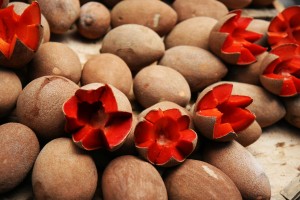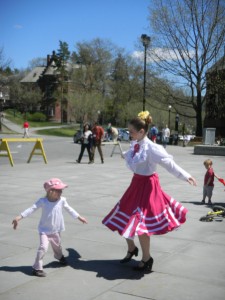IF THERE IS SOMETHING THAT PATTY LOVES is the taste of mamey. A tropical fruit not very well known in the U.S., mamey can be pretty tricky to get a hold of. But that is what Patty requests for her birthday. Every birthday. Forget the last-minute gifts out of an expensive store, she wants mamey.  The fruit, as simple as it is, in a way connects her back to Cuba and the many joyful memories that she holds dear to her heart, a heart that beats to the rhythms of tambores, the quick salsa tumbao, and is fed by the arroz con frijoles of her motherland—all things her parents instill on her and she loves enough to keep alive. She connects with these elements in her everyday life and makes them part of who she is, no matter where she is, whether it be Miami or Hanover. For her, identity is about “feeling” Cuban inside her spirit.
The fruit, as simple as it is, in a way connects her back to Cuba and the many joyful memories that she holds dear to her heart, a heart that beats to the rhythms of tambores, the quick salsa tumbao, and is fed by the arroz con frijoles of her motherland—all things her parents instill on her and she loves enough to keep alive. She connects with these elements in her everyday life and makes them part of who she is, no matter where she is, whether it be Miami or Hanover. For her, identity is about “feeling” Cuban inside her spirit.
Yet, Patty regards herself as an American girl. She doesn’t even sees herself as Canadian even though she holds a passport for that country. Since she lived there for such a short period of time—at least in her memory—, she doesn’t feel she can’t connect with a Canadian identity.  Moreover, throughout her many years in the United States, in which she has met other people from other parts of the world, she has come to realize that she does not have to give up her Cuban roots and assimilate. As independent and determined as she is, Patty remains in full control of her own identity, even when it comes into questioning by umbrella terms such as Latino/a. She doesn’t get it—she knows that there are commonalities in cultures such as beliefs, practices, language and food—, but she feels that it doesn’t fit quite right. She would like to see beyond that towards a more holistic view of identity, one in which she can fit in all that she is, her history, her family and friends, her dreams, her passions and above all, her unyielding desire to live life to the fullest.
Moreover, throughout her many years in the United States, in which she has met other people from other parts of the world, she has come to realize that she does not have to give up her Cuban roots and assimilate. As independent and determined as she is, Patty remains in full control of her own identity, even when it comes into questioning by umbrella terms such as Latino/a. She doesn’t get it—she knows that there are commonalities in cultures such as beliefs, practices, language and food—, but she feels that it doesn’t fit quite right. She would like to see beyond that towards a more holistic view of identity, one in which she can fit in all that she is, her history, her family and friends, her dreams, her passions and above all, her unyielding desire to live life to the fullest.
